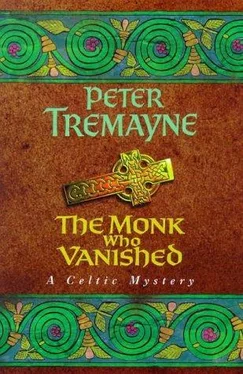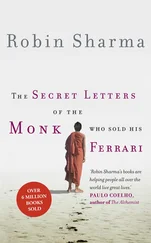Peter Tremayne - The Monk Who Vanished
Здесь есть возможность читать онлайн «Peter Tremayne - The Monk Who Vanished» весь текст электронной книги совершенно бесплатно (целиком полную версию без сокращений). В некоторых случаях можно слушать аудио, скачать через торрент в формате fb2 и присутствует краткое содержание. Жанр: Исторический детектив, на английском языке. Описание произведения, (предисловие) а так же отзывы посетителей доступны на портале библиотеки ЛибКат.
- Название:The Monk Who Vanished
- Автор:
- Жанр:
- Год:неизвестен
- ISBN:нет данных
- Рейтинг книги:3 / 5. Голосов: 1
-
Избранное:Добавить в избранное
- Отзывы:
-
Ваша оценка:
- 60
- 1
- 2
- 3
- 4
- 5
The Monk Who Vanished: краткое содержание, описание и аннотация
Предлагаем к чтению аннотацию, описание, краткое содержание или предисловие (зависит от того, что написал сам автор книги «The Monk Who Vanished»). Если вы не нашли необходимую информацию о книге — напишите в комментариях, мы постараемся отыскать её.
The Monk Who Vanished — читать онлайн бесплатно полную книгу (весь текст) целиком
Ниже представлен текст книги, разбитый по страницам. Система сохранения места последней прочитанной страницы, позволяет с удобством читать онлайн бесплатно книгу «The Monk Who Vanished», без необходимости каждый раз заново искать на чём Вы остановились. Поставьте закладку, и сможете в любой момент перейти на страницу, на которой закончили чтение.
Интервал:
Закладка:
‘You know who the raiders were?’ demanded Fidelma.
‘I have a good idea.’
‘Very well. Let’s hear your story from the beginning,’ invited Fidelma. ‘Your brother, Baoill, was part of a conspiracy to bring down the Royal House of Cashel. How did this come about?’
Brother Mochta lay back and tried to gather his thoughts.
‘It is best that I start at the beginning. I was born in the territory of Clan Brasil …’
‘That we already know,’ Eadulf interrupted only to be met with a frown of irritation from Fidelma.
‘Go on, Mochta,’ she invited.
‘I am a northerner, therefore. My brother and I were, as you realise,identical twins. We were so alike that no one could recognise us apart; not even our mother at times. We grew up as wild and rebellious youths. When we were approaching the age of choice, our distracted father paid a wandering tattooist to inscribe an emblem on our forearms so that he might tell us apart. We bribed the tattooist to place exactly the same emblem on both our left forearms. A bird of prey …’
‘A buzzard,’ smiled Fidelma. ‘I recognise it. What made you choose that particular bird?’
Mochta grimaced. ‘Because it is only found on our wild north-east coast and it was familiar with the tattooist who also came from that area. There was no other reason.’
‘I see. Continue.’
‘Our father was angry with us when he discovered our prank. In fact, he had been angry with our growing youthful rebelliousness and high spirits for some time. When the time came, and we reached the age of choice, he told us that the choice before us was a simple one. We could choose what to do in life so long as we both left home and persecuted him no more.’
‘So you went into the religious life,’ Eadulf prompted when the monk paused, reflecting. ‘A strange sort of life for such high-spirited youths. Surely there were other occupations more suited?’
‘Our high spirits were damped when the door of our father’s house shut against us, Brother Saxon. Somehow we both decided to enter the abbey of Armagh, which is in our clan lands where Patrick …’
‘We know of the history of Armagh,’ Fidelma assured him shortly.
‘Well, we both trained as scriptors there. Then we began to grow apart. My brother decided to follow the Rule of Rome which is encouraged at Armagh. I felt our traditional ways were better and so I rebelled against Armagh and adopted the tonsure of St John. I had a fair reputation for my penmanship and so I bade farewell to my brother and wandered for a while, being welcomed at several abbeys and even at chiefly courts who were in need of a scribe. That is how I eventually arrived in this kingdom and joined the community of Imleach. That was ten years ago.’
‘Did you keep in touch with your brother during that time?’ Mochta shook his head. ‘Once or twice only. Through him I learnt that our parents had died. We had an older brother who took over their farm. But we had all became strangers to one another.’
‘And you saw no more of your brother until recently?’
‘That is right. Baoill had, it seems, become a more fanatic adherent of Rome than ever, which is to be understood for Ultan, the Comarbof Patrick, his abbot and bishop of Armagh, is in favour of extending the rule through all the five kingdoms.’
Fidelma made an affirmative gesture. ‘I know of Ultán’s ambition to unite all the churches in the five kingdoms in the manner of Rome, with one central primacy and rule. It will never work here because it is against our culture.’ She paused and was apologetic. ‘I take it that you disagreed with your brother’s views?’
‘Even as you say, Sister. I believe in the traditions of our people and not in these new ideas that spring from foreign places.’
‘So how did you come to meet your brother again?’
‘As you may know, from being a scriptor I had risen to become the Keeper of the Holy Relics of Ailbe. There is no need to tell you what those Relics symbolise in this kingdom?’
‘No need at all,’ agreed Fidelma gravely.
‘Well, a week or two ago, a man came to the abbey and asked to see me. He looked like a professional warrior. Tall, with long fair hair and …’
‘Armed with a bow?’ Eadulf chimed in. ‘An archer?’
Mochta nodded. ‘Yes. He had the appearance of a professional archer. He told me that he had a message from my brother, Baoill, who wanted to meet me. He stressed that because of certain matters, which he left unexplained, Baoill wanted to meet me alone and in secret. The archer was staying in the inn run by Cred. Intrigued by this approach, I went to Cred’s inn. She opened the door and, thankfully, I did not see anyone else. For the Father Abbot frowned on that place. His anger would have been great if he knew that I was visiting anyone there.’
‘Go on.’
‘Cred told me that the archer was waiting for me in an upstairs room. And so was my brother, Baoill. After we had exchanged greetings, as only two brothers who had not seen each other for a long time could do, we fell to talking politics … church politics mostly. It was then that I became aware of his views. Once he knew mine, he suddenly avoided the subject. He was a clever man, that brother of mine.
‘He turned the conversation by saying that he had heard that I was one of the scribes working on the ‘Annals of Imleach’. I confirmed that I was. He asked me what date had I given to the foundation of Armagh. I told him that its foundation I had accorded to the year of Our Lord Four Hundred and Forty-Four. He then asked, on what date I had placed the repose of Patrick. So I told him the Year of our Lord Four Hundred and Fifty-Two. These dates were not in dispute.
‘It was when he started to ask about the dates accorded to St Ailbe and the foundation of Imleach that I saw what he was after. He toldme that the northern scribes were placing those dates nearly a hundred years after Patrick.’
‘I saw the notes you had made on the subject for the “Annals”,’ Fidelma said. She drew the vellum out of her marsupium. Mochta glanced at it and nodded.
‘I stand by what I say. When I told Baoill that it was absurd for Ailbe’s dates to be made so much later because he preached the Faith in Muman before Patrick and, indeed, had jointly baptised the King of Muman — your own ancestor Oenghus Nad Froích — with Patrick at Cashel, Baoill began to argue with me again.’
‘But what does this bickering about dates mean?’ demanded Eadulf, trying to follow but succeeding only in being bewildered.
‘I understood from my brother that he was trying to persuade me to record Ailbe as someone who came after Patrick. To state that Ailbe and his followers founded Imleach after Armagh had been established. He even wanted me to assert that Ailbe should not be regarded as patron of Muman and that Cashel be accorded the title “The Rock of Patrick”. He wanted my writing to support the claims that Armagh had the historical right to claim to be the primacy of the Faith among all the five kingdoms.’
Fidelma looked grim. ‘I know all about the ambition of Ultán of Armagh. He is not the first Comarb of Patrick who has wished for Armagh to be established as the primacy in all five kingdoms and the churches to be brought under the Rule of Rome. To do that he must first ensure that Imleach’s claims to be the primacy of Muman are discredited. But, surely, this is not what these events are all about?’
‘I scarce know myself, Sister,’ confessed Brother Mochta. ‘All I know is that my brother turned to the subject once again and this time to the Holy Relics of Ailbe. How clever he was. He played on my vanity. I had told him that there was a date on some of the Relics which would prove the date when Ailbe was made bishop. He said he would believe if he could see the Relics. I told him to come to the abbey but he refused, saying that it was not seemly that my twin brother should be seen at Imleach with the tonsure of Rome. It was a silly excuse but I did not think more of it. Instead, I suggested that he came in secret to the gate which led into Bardán’s herb garden one evening and I would show him the Relics. He agreed and said that this would resolve the dispute between Armagh and Imleach.’
Читать дальшеИнтервал:
Закладка:
Похожие книги на «The Monk Who Vanished»
Представляем Вашему вниманию похожие книги на «The Monk Who Vanished» списком для выбора. Мы отобрали схожую по названию и смыслу литературу в надежде предоставить читателям больше вариантов отыскать новые, интересные, ещё непрочитанные произведения.
Обсуждение, отзывы о книге «The Monk Who Vanished» и просто собственные мнения читателей. Оставьте ваши комментарии, напишите, что Вы думаете о произведении, его смысле или главных героях. Укажите что конкретно понравилось, а что нет, и почему Вы так считаете.












